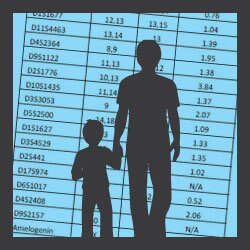A DNA paternity test is the most reliable method for determining whether or not a man is the biological father of a child, and this type of testing is trusted by courts from coast to coast and around the world. But what happens if a mother or a possible father refuses to do a paternity test? Is this happening to you? Here are some possible solutions.
Can a DNA Paternity Test be Done Without the Father?

It is possible to have a DNA paternity test without the father’s direct involvement.
One way is to test the father’s parents or his first degree relatives. Or, non-standard samples from the father, such as an autopsy sample can be used. However, a Chain of Custody form that authorizes the procedure must be signed and processed in order for the court to recognize the validity of the results. And, the results will be less conclusive if the sample is biologically further away from the father’s closest living relative.
Paternity Testing be Done Without the Father’s Knowledge
Conducting a DNA paternity test without the father’s knowledge is called a “non-legal” paternity test. But results to hold up in court, the father tested must be aware of the testing. Legally, he must sign a Chain of Custody form that authorizes the test.
DNA tests can be conducted without the father knowing, but the results will be strictly for personal information and use only. This is why DNA home kits have seen some interest. A person can work with an outside laboratory for the testing material needed to collect evidence from the father and the child. Samples can be taken and sent in for analysis. But because the father’s awareness and consent of the test is non-existent, the test cannot be used as evidence in court.
Can the Father Refuse DNA Paternity Testing?
The alleged father of a child does have the right to refuse a court-ordered DNA paternity test. However, he will experience legal consequences for doing so. DNA testing is typically considered a civil lawsuit, which the judge uses to force the alleged father to submit to at a court-approved facility.
If the alleged father refuses to take the test at this point, he can be held in contempt of court. This can lead to legal consequences such as fines and criminal charges. If a paternity suit gets filed, the court won’t necessarily force the alleged father to have a paternity test right away. First, it will review the facts of the situation. If there’s enough information to warrant a paternity test, the court will issue the order.
How Accurate is a DNA Paternity Test?
If you are able to get a sample directly from the father, as is the case with simple buccal cheek swabs, these tests can have up to 99.9999% accuracy.
DNA tests are powerful tools when determining paternity in divorce and related custody or child support cases. They help women identify biological fathers, and alleged fathers prove they are not biological fathers.
What matters most is how the samples are collected. They must follow the chain-of-custody process. When being tested, mothers and named fathers must present a valid ID, sign the Chain of Custody authorization, and their samples must be securely attached to their ID. It’s worth repeating but if DNA samples are collected without the knowledge of the other party that makes the test invalid in court.
Can You Contest the Results of a Potentially Falsified DNA Test?
In some cases, even accurate DNA test results can be contested. There are a few situations where this can happen:
- If the result is believed to be fraudulent
- In cases where the alleged father proves he is infertile
- Clear evidence is available showing someone has tampered with the lab results
How Many DNA Tests Are Done Each Year?
In 2006, the National Institutes of Health conducted a study that showed 300,000 paternity tests are performed each year in the United States. Since then, however, that number has grown steadily, climbing to 400,000, according to the New York Times. The latter article also notes that men who question whether they are the biological father of the child they’re raising are in fact not the biological father about 30% of the time. Thirty percent is a high number.
The AABB has found that number has surged to 500,000. Most of these tests are requested by child support agencies. The bottom line: paternity tests are a useful tool for proving paternity in divorces and other legal cases. If you are trying to determine paternity, just make sure you have the results collected legally by using a Chain of Custody.
The AABB offers a great tool to see the facts on actual lab numbers for 2013 AABB Public Numbers


